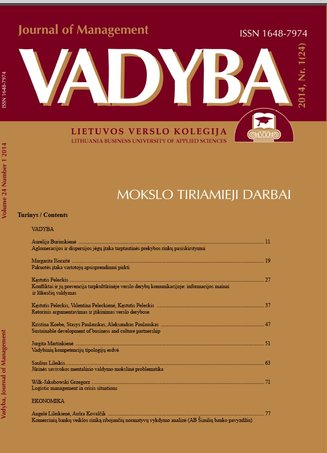PELNO MOKESČIO VENGIMO TENDENCIJOS IR MASTAI
TENDENCES AND SCALE OF PROFIT TAX EVASION
Author(s): Vaclovas LakisSubject(s): Economy
Published by: Lietuvos verslo kolegija
Keywords: Expanses; profit; profit tax; shadow economy; tax burden.
Summary/Abstract: The significance of taxes is important to every state, because it is the main source of a country’s budget revenue. Therefore, it is important to create such system of taxes which would verify stable and sufficient income and would minimize the evasion of paying taxes. If taxes, which are levied on, are too big or incorrect, it stimulates the development of shadow economy, the consequence of which is tax losses, which occur because of tax evasion. Profit tax is the tax which brings about many questions and many practical problems. Because of the complicated calculation of profit tax basis, many ways of tax evasion are used. The causes of tax evasion can be divided into two groups: psychological and procedural. Psychological issues are connected with entities that avoid paying any kind of taxes. A part of procedural process is related with entities that avoid paying any profit tax. While forming tax system, it is very important to define taxable limit. Every time, when tax tariffs increase, taxable income increases slower. This rule is applied when the value of gross domestic product does not change. The profit tax evasion can be caused by manipulations in accounting data or in expanding shadow business. Manipulation of accounting data causes the decrease of income, increase of expenses, or improper levy of tax relief on some activities. There is no reliable data which might present information about tax evasion due to the above mentioned reasons. But, according to the reports, presented by State Tax Inspectorate and other institutions about taxable verification and investigation how many additional taxes were imposed on, the amounts are rather big. The collection of income tax is greatly influenced by the scale of shadow economy and changes in gross domestic product. Shadow economy constitutes a big part of GDP. The amount of it in the period of 1997 – 2001 and 2007 – 2008 decreased in Lithuania, but in the years of 2009 – 2010 increased because of recession. In 2011 it stabilized and it made about 27% of GDP. The biggest part of shadow economy constitutes smuggling of cigarettes, alcohol, petrol and other goods. The extent, how big the shadow economy is, depends on the tax burden, and income tax evasion absolute dimension depends on how big the GDP is. The greatest growth of burden of taxes, profit tax among them, was in 2008, when the gross tax burden was 31,1% , profit tax burden was 2,6 % of GDP, and the least tax burden was in 2011and it made 0,82 % of GDP. When the recession started and the taxable burden increased, the profit tax avoidance in 2008 increased by 38,8 percentage point compared with 2007. Later, the scale of avoidance decreased, but in 2011 it went up again, though the pre – crisis level was not achieved. On the basis of investigation, the conclusion can be made, that profit tax evasion is connected with the economic situation and tax burden in the country.
Journal: VADYBA
- Issue Year: 24/2014
- Issue No: 1
- Page Range: 121-128
- Page Count: 8
- Language: Lithuanian

